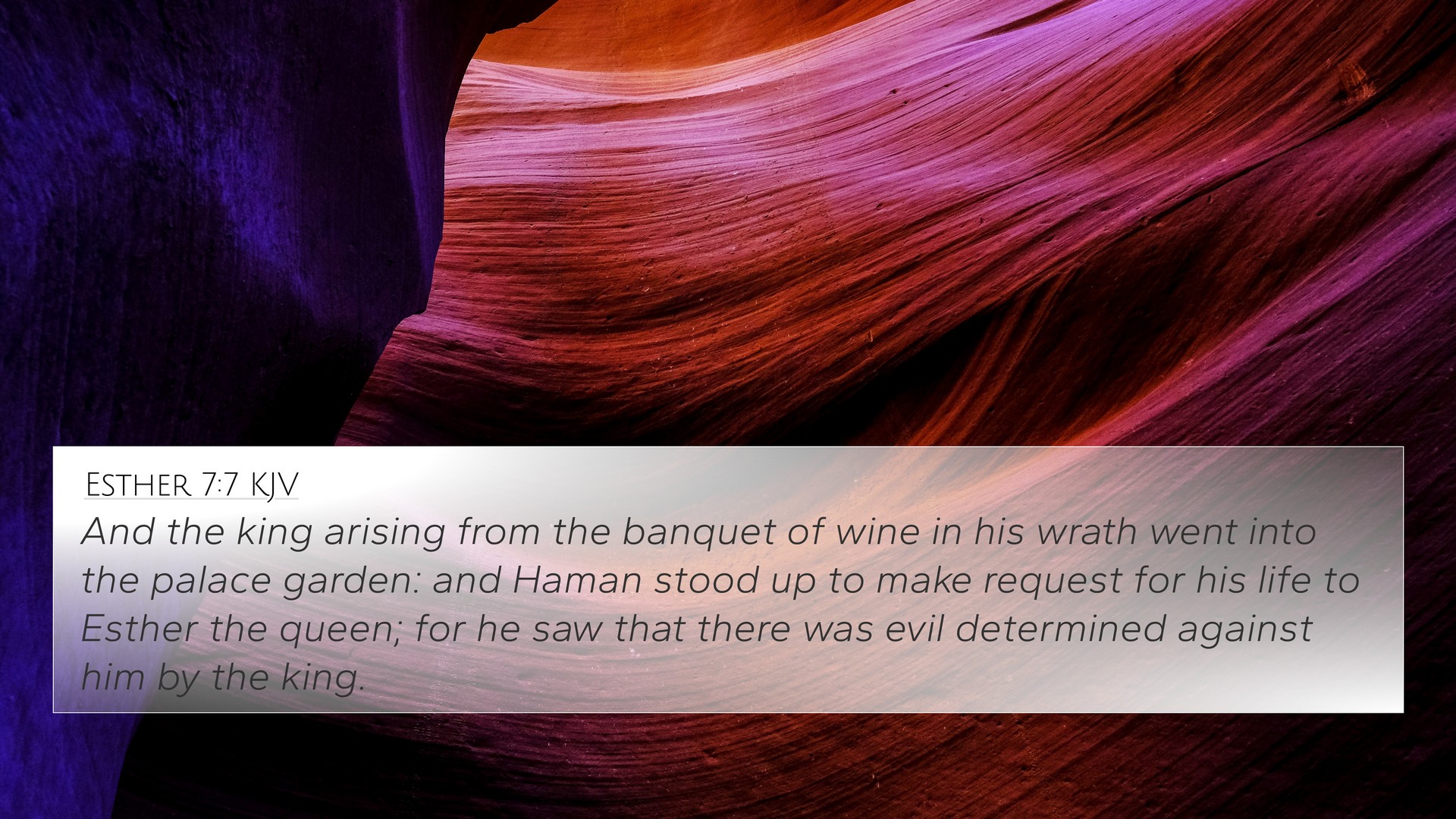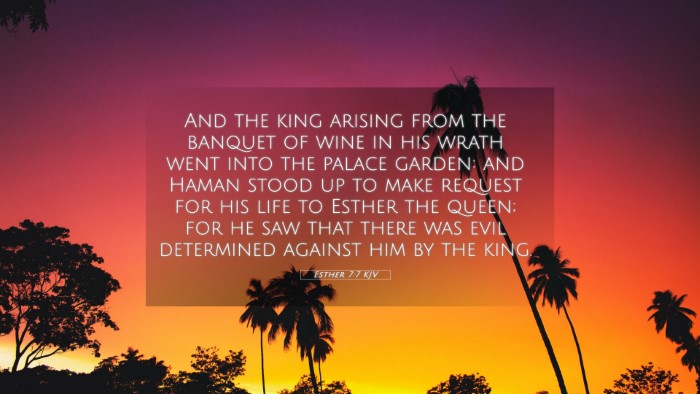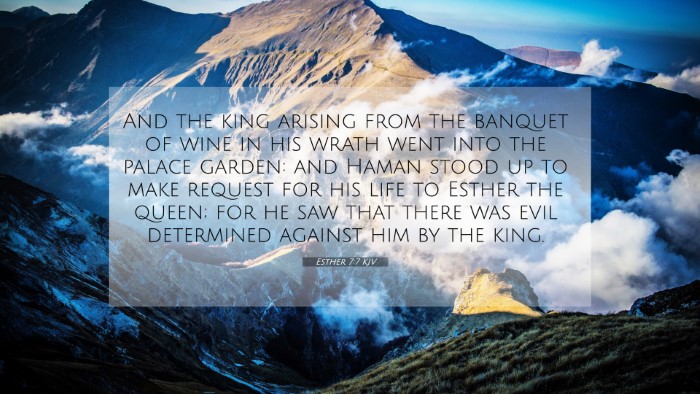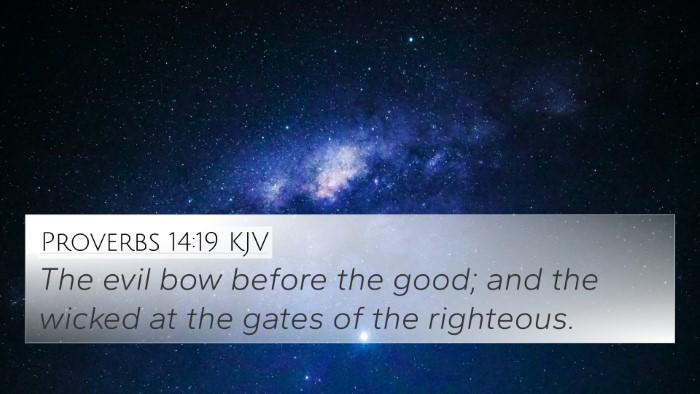Old Testament
Genesis Exodus Leviticus Numbers Deuteronomy Joshua Judges Ruth 1 Samuel 2 Samuel 1 Kings 2 Kings 1 Chronicles 2 Chronicles Ezra Nehemiah Esther Job Psalms Proverbs Ecclesiastes Song of Solomon Isaiah Jeremiah Lamentations Ezekiel Daniel Hosea Joel Amos Obadiah Jonah Micah Nahum Habakkuk Zephaniah Haggai Zechariah MalachiEsther 7:7 Similar Verses
Esther 7:7 Cross References
And the king arising from the banquet of wine in his wrath went into the palace garden: and Haman stood up to make request for his life to Esther the queen; for he saw that there was evil determined against him by the king.
Uncover the Rich Themes and Topics of This Bible Verse
Listed below are the Bible themes associated with Esther 7:7. We invite you to explore each theme to gain deeper insights into the Scriptures.
Esther 7:7 Cross Reference Verses
This section features a detailed cross-reference designed to enrich your understanding of the Scriptures. Below, you will find carefully selected verses that echo the themes and teachings related to Esther 7:7 KJV. Click on any image to explore detailed analyses of related Bible verses and uncover deeper theological insights.
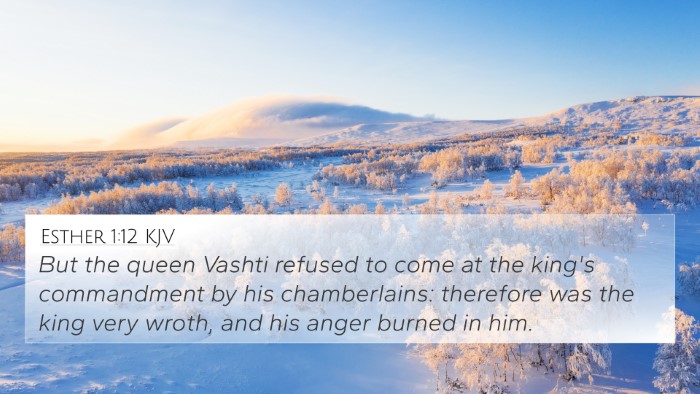
Esther 1:12 (KJV) »
But the queen Vashti refused to come at the king's commandment by his chamberlains: therefore was the king very wroth, and his anger burned in him.
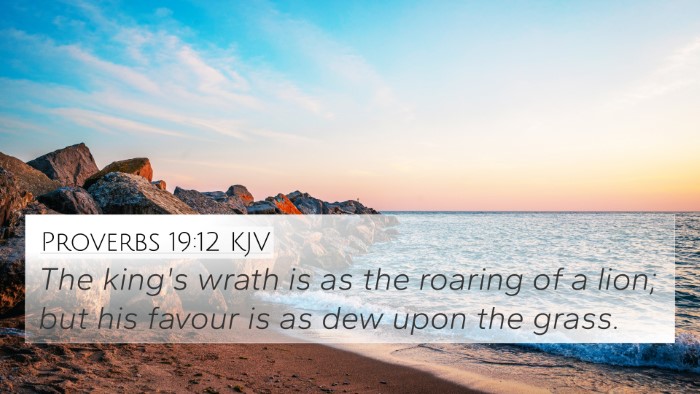
Proverbs 19:12 (KJV) »
The king's wrath is as the roaring of a lion; but his favour is as dew upon the grass.
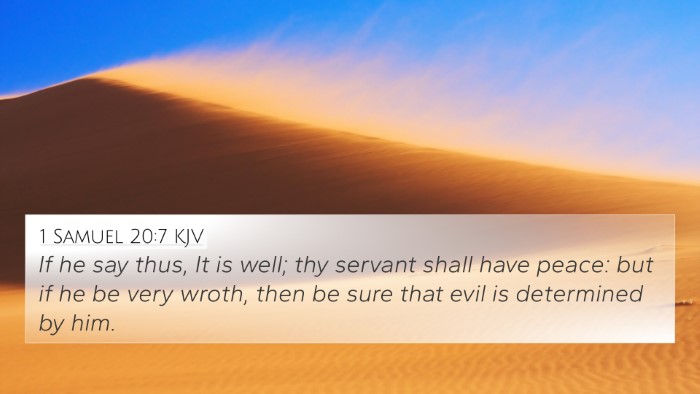
1 Samuel 20:7 (KJV) »
If he say thus, It is well; thy servant shall have peace: but if he be very wroth, then be sure that evil is determined by him.
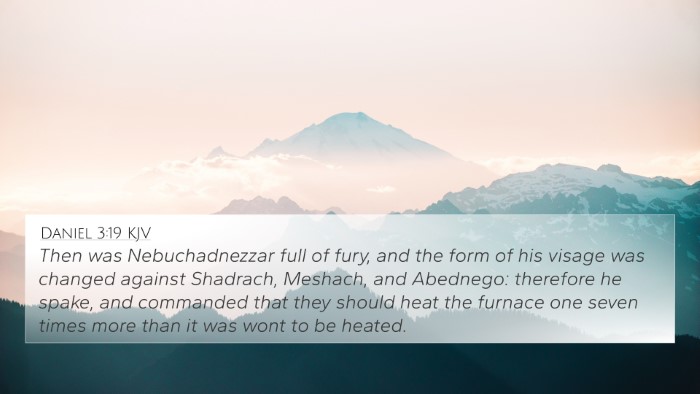
Daniel 3:19 (KJV) »
Then was Nebuchadnezzar full of fury, and the form of his visage was changed against Shadrach, Meshach, and Abednego: therefore he spake, and commanded that they should heat the furnace one seven times more than it was wont to be heated.
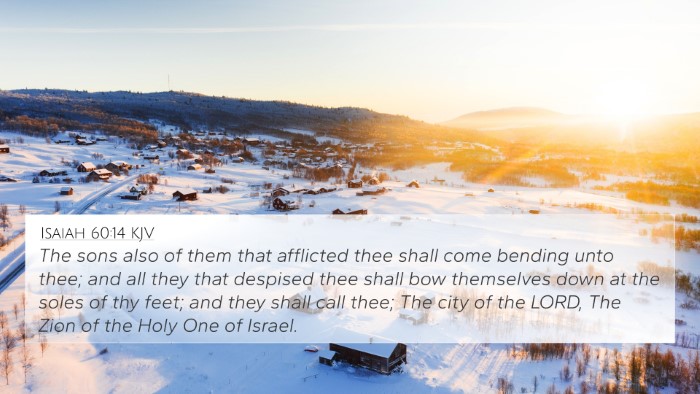
Isaiah 60:14 (KJV) »
The sons also of them that afflicted thee shall come bending unto thee; and all they that despised thee shall bow themselves down at the soles of thy feet; and they shall call thee; The city of the LORD, The Zion of the Holy One of Israel.
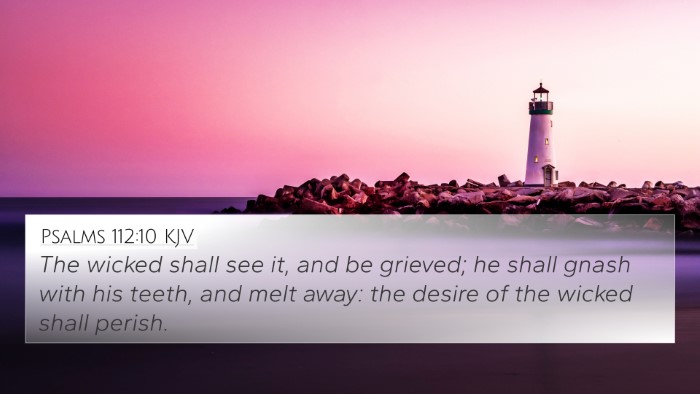
Psalms 112:10 (KJV) »
The wicked shall see it, and be grieved; he shall gnash with his teeth, and melt away: the desire of the wicked shall perish.

1 Samuel 20:9 (KJV) »
And Jonathan said, Far be it from thee: for if I knew certainly that evil were determined by my father to come upon thee, then would not I tell it thee?
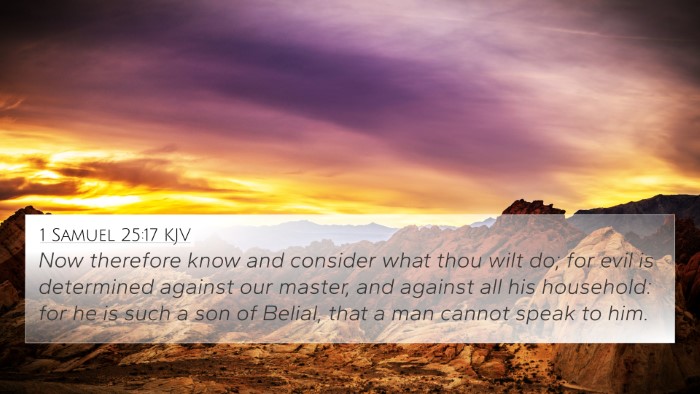
1 Samuel 25:17 (KJV) »
Now therefore know and consider what thou wilt do; for evil is determined against our master, and against all his household: for he is such a son of Belial, that a man cannot speak to him.
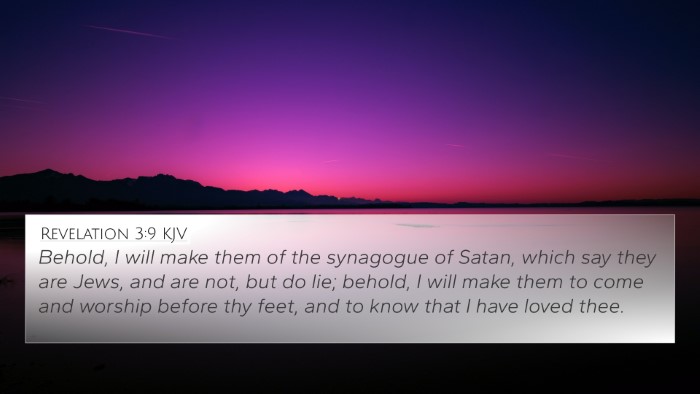
Revelation 3:9 (KJV) »
Behold, I will make them of the synagogue of Satan, which say they are Jews, and are not, but do lie; behold, I will make them to come and worship before thy feet, and to know that I have loved thee.

Esther 1:5 (KJV) »
And when these days were expired, the king made a feast unto all the people that were present in Shushan the palace, both unto great and small, seven days, in the court of the garden of the king's palace;
Esther 7:7 Verse Analysis and Similar Verses
Esther 7:7 - Meaning and Interpretation
Esther 7:7 is a pivotal verse within the narrative of the Book of Esther, filled with deep implications regarding providence, justice, and the triumph of good over evil. In this verse, we witness the moment when King Ahasuerus learns of Haman's treachery against Queen Esther and her people. The insights drawn from public domain commentaries provide a comprehensive understanding of the emotions and the lessons embedded in this scripture.
Context and Overview
The context set in Esther 7 reveals the escalating tension between Haman, who plotted against the Jews, and Esther, who courageously reveals her identity and Haman’s plan. This scene deepens the plot and highlights God’s providential care over His people, presenting a dramatic turn of events.
Commentary Insights
-
Matthew Henry:
Henry emphasizes the deliverance theme in Esther. He notes that Esther's bold confrontation is a fulfillment of God's purpose for His people. She stands as a type of intercessor, advocating for the Jews at great personal risk, reflecting God's protective nature over His chosen ones.
-
Albert Barnes:
Barnes highlights the significance of timing in God's plan. Haman’s downfall is portrayed as a direct consequence of divine justice. He draws parallels with other Biblical texts, illustrating how God often turns the plans of the wicked upon themselves (see Psalm 7:15).
-
Adam Clarke:
Clarke discusses the moral implications of Esther's revelations. He points out that true courage often requires revealing uncomfortable truths and that this moment exemplifies a divine reversal of fortunes, reinforcing the idea that evil will not ultimately triumph.
Thematic Connections
This verse resonates with several themes found throughout the Bible:
- Divine Justice: The events in Esther underscore the Biblical principle that God upholds justice and righteousness.
- Courage and Advocacy: Esther's bravery in speaking out for her people is a powerful lesson in advocacy against oppression.
Cross-References
Understanding Esther 7:7 can be enriched by examining related scripture. Here are key cross-references:
- Proverbs 11:8: "The righteous is delivered from trouble, and the wicked comes in his stead." This verse highlights the divine reversal of fate for both the righteous and the wicked.
- Psalm 137:8-9: This passage laments the destruction of the wicked, emphasizing the overarching theme of justice against those who pursue harm against God’s people.
- Isaiah 54:17: "No weapon formed against you shall prosper…" This verse serves as a promise of protection for those who trust in God amidst trials.
- Galatians 6:7: "Whatever one sows, that will he also reap." Haman’s downfall serves as a tangible manifestation of this principle.
- Romans 12:19: "Vengeance is mine, I will repay, says the Lord." Here we see God affirming His role as ultimate judge over human actions.
- James 4:10: "Humble yourselves before the Lord, and he will exalt you." Esther’s humility before the king becomes the key to her exaltation and the deliverance of her people.
- Matthew 10:26: "For there is nothing covered that will not be revealed, and hidden that will not be known." This reinforces the Biblical theme that truth will ultimately prevail.
Practical Applications
The implications of Esther 7:7 extend beyond its historical context:
- Courage in Advocacy: Believers are reminded of the importance of speaking out against injustice, as exemplified by Esther.
- Trust in Divine Justice: This verse encourages faith in God's timing and His ability to bring about righteousness.
Conclusion
In summary, Esther 7:7 represents more than a mere historical account; it serves as a rich source for theological reflection and practical application in the contemporary world. By engaging in scriptural cross-referencing and exploring thematic connections within the Scriptures, we can deepen our understanding of this vital passage. The act of cross-referencing Biblical texts not only enriches personal study but aids in sharing the profound truths found in God’s Word.
